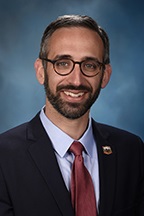Representative Will Guzzardi is serving his fourth term with the Illinois General Assembly. Currently, he serves as the Chair of the House Prescription Drug Affordability committee and the Housing committee. He is also the founding Co-Chair of the Illinois House Progressive Caucus. During his time representing Illinois’ 39th District, he has been a champion for the working class and families most in need.

For this issue of the PCC Higher Ed Policy Quarterly newsletter, Representative Guzzardi discusses the importance of equitable opportunities in higher education in Illinois and his goals and vision for his district and for the next legislative session.
1. Please provide us with a brief bio about yourself.
I have represented the 39th District in the Illinois House since 2015, serving the Logan Square, Portage Park, Belmont Cragin, Hermosa, and Avondale neighborhoods of Chicago. In the General Assembly, I chair the Housing Committee and the Prescription Drug Affordability Committee, and I’m a founding co-chair of the Illinois House Progressive Caucus. During my four terms in office, I’ve fought for workers rights, healthcare access, affordable housing, and empowerment for undocumented Illinoisans. In February of 2019 I was the sponsor of our historic legislation raising Illinois’s minimum wage to $15 per hour by 2025.
I’m originally from North Carolina, and I graduated from Brown University in 2009. Prior to joining the General Assembly, I was an editor for Huffington Post Chicago and the head writer for admissions at the University of Chicago. I was also an active organizer in my community, joining with neighbors to fight school closures and advocate for an elected school board in Chicago.
2. As lawmakers prepare for the next General Assembly, what issues will you focus on in the 103rd GA?
In the 103rd General Assembly, I plan to continue my focus on housing issues with a special emphasis on homelessness. We’ll look at what investments can most effectively bring our state to functional zero homelessness, and what policies need to be aligned with that aim to make it a reality. I also intend to work on issues around mental health crisis response, fighting the opioid crisis, and making higher education more affordable.
3. What are your constituents’ biggest challenges related to higher education access, affordability, and completion? How can the state and institutions help address those concerns?
My constituents’ biggest barrier to higher ed is that it just costs too much. Even those constituents who can successfully navigate the FAFSA process (which is a pretty high bar in its own right), those who do receive support with tuition and fees, still often find the other costs of attendance too high to bear. Books, transportation, housing, and the lost income from time spent at school is a combination of financial factors that many of my neighbors simply can’t bear. Obviously, many of those challenges go beyond the scope of the higher education system — access to transit, for instance, or affordable housing — but lowering the costs of attendance and creating more sources of aid that can be applied to the total cost of college would be very helpful to these constituents.
4. If you could pass a law addressing any of those concerns, what would it be?
If I could wave a magic wand, I’d make every two- and four-year public school in Illinois debt-free for everyone. And I think this is achievable! It’ll just require the political will to make it happen and the investment in our system that’s been lacking for far too long.
5. How can advocates work with your office to promote equitable public policy?
I’d like to think our office is pretty approachable for advocates. If folks have an issue they want to discuss with me, please just reach out! And we’re also trying to be proactive, joining with other coalition partners to build working groups and stakeholder roundtables on the issues that we’re fighting for. I think the most effective way to make transformative policy change is when advocates, grassroots leaders, and community organizations are in thoughtful and intentional partnership with their legislative allies — that kind of “inside-outside” game is how big things happen!
Read the December 2022 issue of PCC’s Higher Ed Policy Quarterly.

